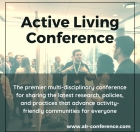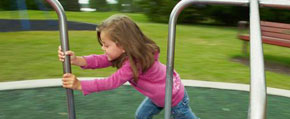7:15 a.m. - 4:30 p.m. Conference Registration
7:30 a.m. - 8:30 a.m. Breakfast
7:30 a.m. - 8:30 a.m. Breakfast Roundtable Discussions
8:30 a.m. - 9:00 a.m. Overview and Technology & Resource Announcements
James F. Sallis, Ph.D., Director, Active Living Research
Technology Vendors in Attendance
9:00 a.m. - 10:30 a.m. Panel Presentation
Engaging Communities: Lessons from the Field
This panel is inspired by the realization that the most successful environmental and policy changes are a result of momentum initiated from the grassroots and pushed upward. In order to reverse childhood obesity by 2015, community efforts are needed to create societal changes so we do not lose a generation of children to chronic obesity. This panel discussion will feature inspiring leaders with strong backgrounds in community engagement and mobilization. The participants will learn effective methods of engaging members of diverse communities in both research and advocacy related to active living and obesity prevention.
Panel Moderator
Makani Themba-Nixon, Executive Director, The Praxis Project and Communities Creating Healthy Environments (a national program of RWJF)
Panel Members
Engaging Communities [pdf], Elva Yanez, Consultant in Public Health; Urban Parks and Land Conservation; Land Use; and Environmental and Social Justice
America's Great Urban Parks: Designed for Active Living [pdf], Meg Cheever, President & CEO, Pittsburgh Parks Conservancy
10:30 a.m. - 10:45 a.m. Break
10:45 a.m. - 11:45 a.m. Keynote Speaker Presentation
Angela Glover Blackwell, J.D., Founder and Chief Executive Officer, PolicyLink
Engaging Communities to Create Active Living Environments
How do you work effectively with engaging communities in community development, developing interventions and developing relevant research? What are proven, measurable strategies to engage communities, in particular disadvantaged communities at highest risk? Angela Glover Blackwell will address these questions through lifting up successful, innovative practices, outlining proven strategies, and describing core principles to guide research that can influence policy and practice.
11:45 a.m. - 12:15 p.m. Active Living Research: Translating Research to Policy Award Presentation
Award Presenter: James F. Sallis, Ph.D., Director, Active Living Research
Award Presentation: From NIH to Texas Schools: Implementing the Coordinated Approach to Child Health (CATCH) Program in Texas [pdf]
12:15 p.m. - 1:30 p.m. Lunch
1:30 p.m. - 2:30 p.m. Plenary Presentations
1) Better Parks Through Policy: A Legal Analysis of Authorities Governing Public Recreation Facility Provision and Maintenance, Ana Henderson, A.B., J.D., Ph.D. Candidate, University of California, Berkeley & Christine R. Fry, M.P.P., National Policy & Legal Analysis Network to Prevent Childhood Obesity.
2) Cost-effectiveness of Bicycle Infrastructure and Promotion to Increase Physical Activity - The Example of Portland, Thomas Gotschi, Ph.D., Rails-to-Trails Conservancy.
2:30 p.m. - 2:45 p.m. Break
2:45 p.m. - 4:15 p.m. Concurrent Presentation Sessions
SESSION 1 - Parks and Trails
a) How Much Do Park Agencies Market Physical Activity?, Deborah Cohen, M.D., M.P.H., RAND Corporation
b) Children's Choices of Park Elements for Physical Activity, James Roemmich, Ph.D., University of Buffalo
c) The Influence of Park Conditions and Supporting Features on Park-Based Physical Activity, Ariane Rung, Ph.D., M.P.H., Louisiana State University
d) Environmental Correlates of Recreational Path Use in a Diverse Sample of Adults, Lorna McNeill, Ph.D., University of Texas M.D. Anderson Cancer Center
SESSION 2 - Policy Change Research
a) Why Do States Differ in Level of State Childhood Obesity Legislation? A Qualitative Investigation, Ellen Jones, Ph.D., University of Mississippi
b) Land Use Innovation: Experiences in the Adoption of Land Use Policies to Promote Active Living, Jennifer Dill, Ph.D., Portland State University
c) Physical Activity Rates Among Middle School Students in Somerville, MA: Trends Over Time and In Relation to a Comparison Community, Virginia R. Chomitz, Ph.D., Cambridge Health Alliance
d) New York City Active Design Guidelines: Promoting Physical Activity and Health in Design - Translating Active Living Research into City Policies and Practices, Karen Lee, M.D., M.H.Sc., F.R.C.P.C., New York City Department of Health and Mental Hygiene
SESSION 3 - Groups at Highest Risk for Physical Inactivity
a) Racial Differences in Park Use and Park-Based Physical Activity, Andrew Mowen, Ph.D., The Pennsylvania State University
b) Context-Specific Correlates of Walking to School: Do They Vary Across Neighborhoods and Populations?, Xuemei Zhu, Ph.D., Texas A&M University
c) Neighborhood Factors and Physical Activity in African American Public Housing Residents, Rebecca Lee, Ph.D., University of Houston
d) Economic Investment and Program Implementation in Low-Resource Communities through the Federal Safe Routes to School Program, Angie Cradock, Sc.D., Harvard School of Public Health
4:15 p.m. - 4:30 p.m. - Break
Change clothes for physical activity breaks.
4:30 p.m. - 6:00 p.m. Physical Activity Breaks
Activities included:
• Yoga Session
• San Diego Harbor Walk
• Balboa Park Walk
• Running Group
• Eveoke Youth Dance Workout
• Self-Guided Walk
6:00 p.m. - 8:00 p.m. Poster and Technology Session and Reception
Poster Abstracts [pdf]
Technology Vendors included:
• ACCUSPLIT
• ActiGraph, LLC
• New-Lifestyles, Inc.
8:00 p.m. Dinner on your own







